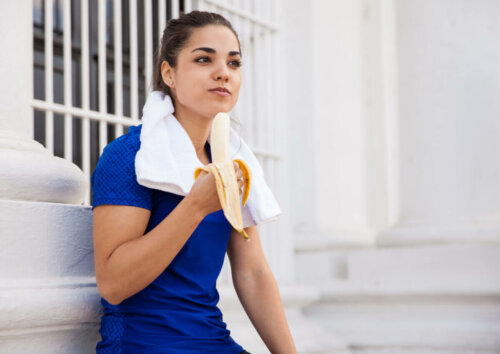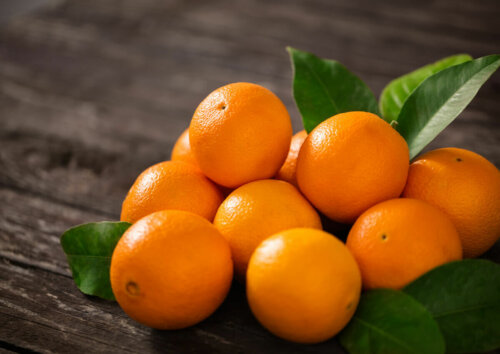Is It Okay to Eat Fruit After Exercising?

Professionals recommend consuming fruit, no matter the diet, with the aim of improving health. In the case of athletes, this isn’t different by any means. In this regard, there’s a series of myths that need to be disproved and clarified. Therefore, in this article, we’ll be discussing if it’s okay to eat fruit after exercising.
First of all, it’s important to bear in mind that the main components of fruit are water, sugars, and micronutrients. Among the latter, antioxidants stand out, serving to help muscle recovery and overall health. However, remember that not all fruits have the same amount of antioxidants.
Fruit after exercising: a source of carbohydrates
Consuming simple carbohydrates after intense exercise is a positive dietary strategy to improve recovery. Actually, research published in the Nutrients Journal has something to say about this. Basically, adding protein along with simple sugars after completing a physical activity improves the body’s ability to replace the glycogen consumed.
According to this article mentioned above, it’s necessary to provide 0.8 grams of sugars per kilogram of weight for each hour of exercise. In this way, firstly, muscle recovery processes are optimized and the risk of injury decreases significantly.
One way to ensure that you meet your nutrient requirements is to eat fruit after exercising. However, it’s vital that you choose those with higher carbohydrate content, such as bananas, berries, and grapes.

Fruit after exercising: provides antioxidants
Other nutrients involved in muscle recovery are antioxidants. These substances block the production of free radicals and reduce cell damage. As a result, they modulate inflammation. In fact, in the Antioxidants Journal, you can find evidence that supports this statement.
However, supplementation with antioxidants isn’t all that beneficial in athletes. The reason for this is that these substances can interfere with muscle signaling pathways. This ability prevents training adaptations from taking place.
Despite this, there’s research that proves that dietary doses of antioxidants are beneficial to the athlete’s body. They help reduce cell damage, inflammation, and recovery time. A suitable way to meet these requirements is by eating fruit after exercising.
To meet the goal, it’s preferable to choose bright-colored fruits, as they usually contain a higher dose of antioxidant substances. We recommend berries, strawberries, or oranges.
The fruit and its hydration capacity
Finally, it should be noted that the fruit has significant water content. Eating fruit after exercising can help replace fluids lost during physical activity, thereby improving later recovery.
To fulfill this function, it’s vital to opt for those varieties with higher water content, such as melon and watermelon. In any case, when it comes to hydration, it’s always necessary to complement the consumption of fruits with enough water intake. Remember to always choose a fresh drink!

Yes, it’s good to eat fruit after exercising
As you can see, there are plenty of benefits to eating fruit after exercising. You can adapt the fruits you consume to your momentary needs. For example, if you happened to do exercise in high-temperature conditions, your best bet will be those fruits with high water content.
On the other hand, if your work out was pretty demanding and exhausting, we recommend you choose those fruits that are high in antioxidants and sugars, such as berries. Another option would be to make a smoothie with a combination of different vegetables to ensure the presence of different types of micronutrients.
Lastly, we must make something clear. To guarantee a correct recovery, it’s utterly necessary to complement fruit intake with a good, balanced meal. If you don’t know how to come up with a good meal plan, don’t worry! Nutritionists are there to help, so don’t hesitate to consult one in order to make sure that the nutrients you consume adapt to the needs of the exercise you practice.
Professionals recommend consuming fruit, no matter the diet, with the aim of improving health. In the case of athletes, this isn’t different by any means. In this regard, there’s a series of myths that need to be disproved and clarified. Therefore, in this article, we’ll be discussing if it’s okay to eat fruit after exercising.
First of all, it’s important to bear in mind that the main components of fruit are water, sugars, and micronutrients. Among the latter, antioxidants stand out, serving to help muscle recovery and overall health. However, remember that not all fruits have the same amount of antioxidants.
Fruit after exercising: a source of carbohydrates
Consuming simple carbohydrates after intense exercise is a positive dietary strategy to improve recovery. Actually, research published in the Nutrients Journal has something to say about this. Basically, adding protein along with simple sugars after completing a physical activity improves the body’s ability to replace the glycogen consumed.
According to this article mentioned above, it’s necessary to provide 0.8 grams of sugars per kilogram of weight for each hour of exercise. In this way, firstly, muscle recovery processes are optimized and the risk of injury decreases significantly.
One way to ensure that you meet your nutrient requirements is to eat fruit after exercising. However, it’s vital that you choose those with higher carbohydrate content, such as bananas, berries, and grapes.

Fruit after exercising: provides antioxidants
Other nutrients involved in muscle recovery are antioxidants. These substances block the production of free radicals and reduce cell damage. As a result, they modulate inflammation. In fact, in the Antioxidants Journal, you can find evidence that supports this statement.
However, supplementation with antioxidants isn’t all that beneficial in athletes. The reason for this is that these substances can interfere with muscle signaling pathways. This ability prevents training adaptations from taking place.
Despite this, there’s research that proves that dietary doses of antioxidants are beneficial to the athlete’s body. They help reduce cell damage, inflammation, and recovery time. A suitable way to meet these requirements is by eating fruit after exercising.
To meet the goal, it’s preferable to choose bright-colored fruits, as they usually contain a higher dose of antioxidant substances. We recommend berries, strawberries, or oranges.
The fruit and its hydration capacity
Finally, it should be noted that the fruit has significant water content. Eating fruit after exercising can help replace fluids lost during physical activity, thereby improving later recovery.
To fulfill this function, it’s vital to opt for those varieties with higher water content, such as melon and watermelon. In any case, when it comes to hydration, it’s always necessary to complement the consumption of fruits with enough water intake. Remember to always choose a fresh drink!

Yes, it’s good to eat fruit after exercising
As you can see, there are plenty of benefits to eating fruit after exercising. You can adapt the fruits you consume to your momentary needs. For example, if you happened to do exercise in high-temperature conditions, your best bet will be those fruits with high water content.
On the other hand, if your work out was pretty demanding and exhausting, we recommend you choose those fruits that are high in antioxidants and sugars, such as berries. Another option would be to make a smoothie with a combination of different vegetables to ensure the presence of different types of micronutrients.
Lastly, we must make something clear. To guarantee a correct recovery, it’s utterly necessary to complement fruit intake with a good, balanced meal. If you don’t know how to come up with a good meal plan, don’t worry! Nutritionists are there to help, so don’t hesitate to consult one in order to make sure that the nutrients you consume adapt to the needs of the exercise you practice.
All cited sources were thoroughly reviewed by our team to ensure their quality, reliability, currency, and validity. The bibliography of this article was considered reliable and of academic or scientific accuracy.
- Alghannam AF., Gonzalezz JT., Betts JA., Restoration of muscle glycogen and functional capacity: role of post exercise carbohydrate and protein co ingestion. Nutrients, 2018.
- Kawamura T., Muraoka I., Exercise induced oxidative stress and the effects of antioxidant intake from a physiological viewpoint. Antioxidants, 2018.
This text is provided for informational purposes only and does not replace consultation with a professional. If in doubt, consult your specialist.








